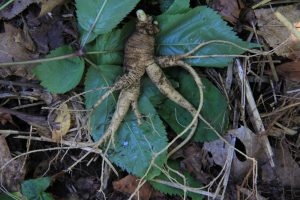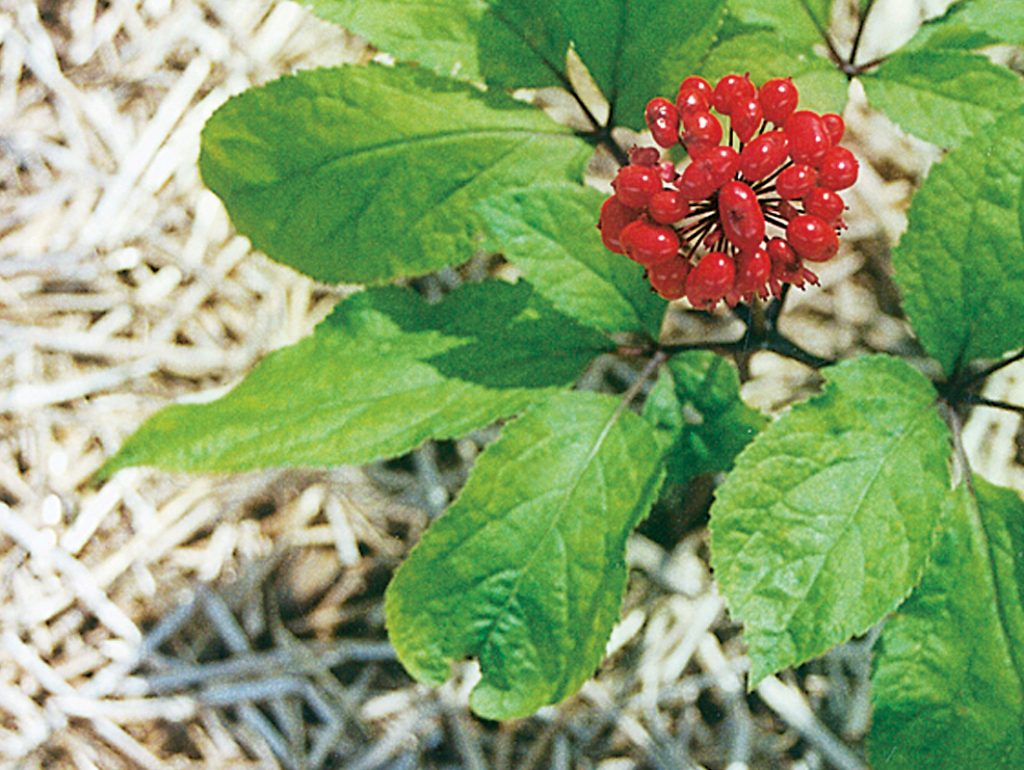Traditional Asian herb ginseng supports cognitive energy and function.

Thanks to its wide array of beneficial effects, Asian ginseng is one of the most popular herbal supplements in the world. Ginseng appears to have several nootropic benefits, including:
- Enhanced cognitive performance. In particular, ginseng seems to improve memory and mental fatigue in healthy individuals.
- Improved mood and well-being. People who take ginseng score better on subjective ratings of mood and well-being
- Neuroprotection. Ginseng’s active compounds may protect neurons from damage, particularly in the context of neurodegenerative conditions.
Overview
Panax ginseng, also known as Asian, Chinese, Red, and Korean ginseng, is a herb that’s been a staple of Chinese folk medicine for thousands of years, and has recently emerged as one of the most widely-consumed supplements in the world. Ginseng preparations typically use the plant’s root because it contains the highest concentrations of active ingredients (ginsenosides).
Panax ginseng is best described as an adaptogen – a herb that helps the body adapt to many different types of stress, including temperature changes, infection, trauma, sleep deprivation, emotional stress and others. Thanks to this, Panax ginseng is used as much for boosting overall health as for treating specific conditions. Some of its most common uses include:
- Increasing energy and stamina
- Boosting immunity
- Helping with depression, anxiety, and stress
- Helping with respiratory and cardiovascular conditions
- Improving sleep & libido
In addition, clinical research indicates that Panax ginseng holds promise as a nootropic that is capable of boosting multiple aspects of cognitive function, including memory, concentration, and mood.

How Ginseng Might Help the Brain
Ginsenoside activity
The main active ingredients of ginseng are called ginsenosides, with more than 30 having been found to date.1 The large variety of ginsenosides may explain why ginseng has so many different effects all found in one plant. 2
Asian ginseng appears to have particularly high concentrations of the Rg1 ginsenoside, which acts as a central nervous system (CNS) stimulant. Researchers believe that ginsenosides are transformed into their active form in the body by intestinal bacteria. The resulting compounds then work via numerous biological activities, including neuroprotection, anti-oxidation, anti-inflammation, immunostimulation, and others.3
Specific examples of these actions include: ginsenosides enhancing neurotransmitter release in brain cells; increasing dopamine, 5-HTP, and noradrenaline levels; and pseudoginsenoside-F11 boosting antioxidant enzyme activity. Even a single ginsenoside may exert its effects through multiple actions.4
Panax Ginseng’s Nootropic Benefits & Uses
The practical nootropic benefits of ginsenoside bio-activities are two-fold. On the one hand, ginseng appears to enhance brain function in healthy individuals, resulting in effects such as reduced mental fatigue, improved memory, attention, reaction time, and mood. On the other hand, ginseng may be a promising therapy for a variety of neurological issues, including Alzheimer’s, Parkinson’s, Huntington’s, ADHD, and depression. 5 6 7 8

Research
Animal Research
Animal studies have provided substantial evidence for Asian ginseng’s nootropic benefits. Specific findings in rodents indicate that:
- Asian ginseng “improves learning, memory and physical capabilities”9 10
- Even the single isolated ginsenoside RB1 is enough to improve “both memory and anxiety at low dosages”11
- Asian ginseng can enhance learning “in both intact and brain damaged” rats12
- Ginseng saponin “exerts antidepressant-like effects in two highly specific and predictive animal models of depression”13
- Ginsenosides protect against brain damage caused by stroke and other types of brain injury14 15
Human Research
Ginseng research for nootropic benefit in humans has been mostly positive, with only a small number of studies showing no effect.
Korean ginseng (200 mg) appears to enhance memory and improve general well-being
In this double-blind, placebo-controlled, crossover study 18 participants were given placebo and 200 mg Korean ginseng extract daily for 8 weeks, with a 4-week washout period in between. Their mood and cognitive function was tested before and during the treatments. Ginseng resulted in improved working memory, better subjective ratings of quality of life, and a shift from a calm mood to a more excited one.
- The researchers concluded that “chronic administration of Korean ginseng was found to modulate working memory performance and ratings of ‘mood’ and ‘quality of life’”16
Asian ginseng (200 mg) appears to enhance cognitive performance during a mentally-demanding tasks
In a double-blind, placebo-controlled, balanced-crossover trial, 27 young adults first completed a mentally-demanding test, and were then given placebo or Asian ginseng extract 200 mg with or without 25 g of glucose. An hour later, they repeated the cognitive demand test six more times. Ginseng was found to improve test performance and reduce mental fatigue regardless of whether glucose was added.
- The researchers concluded that “These results confirm that Panax ginseng may possess gluco-regulatory properties and can enhance cognitive performance”17
Asian ginseng (200-400 mg) appears to induce calmness and improve working memory in young adults
In this placebo-controlled, double-blind, randomized, crossover trial, 30 young adults received each of the following treatments in random order for 8 days: 200 mg Panax ginseng extract, 400 mg, or placebo. They were not given anything for 6 days in-between to eliminate the effects of the previous treatment. Although the study did not find any effects from 7 days of consecutive ginseng supplementation, the participants felt calmer and had improved memory when tested on days 1 and 8.
- The researchers concluded that “…7 consecutive days of ginseng ingestion has no affect on mood or cognitive performance as assessed in the present study. However, results did reveal, for the first time, that single doses (administered on days 1 and 8) of Panax ginseng can modulate working memory performance and improve participants’ subjective self-reports of calmness”18
Korean red ginseng (9 g) may improve cognitive performance in Alzheimer’s patients
This study tested Korean red ginseng (KRG) for treating cognitive impairment in people with Alzheimer’s disease. Sixty-one patients were randomly assigned to one of three groups: placebo, 4.5 g KRG, or 9 g KRG daily for 12 weeks. The researchers found that the 9 g group showed substantial improvement on the Alzheimer’s Disease Assessment Scale (ADAS) and Clinical Dementia Rating (CDR).
- The researchers concluded that “KRG has positive effects on cognitive improvement in Alzheimer’s disease warrants further large-scale, long-term studies to confirm the clinical efficacy of adjuvant KRG therapy”19
Nootropic Dosage
- The most common dosage used by successful mental performance research studies is 200 mg ginseng root
- Panax ginseng supplements typically come in 100 – 500 mg doses
- Some supplements are standardized to contain 4 – 8 % percent ginsenosides (the active ingredient)
Supplements in Review Says
- Panax ginseng, standardized to 5-8% ginsenosides, 200 mg as a nootropic.
Asian ginseng is a legendary performance supplement. Ginseng has been taken for thousands of years to boost mental energy and function, and now clinical research is beginning to provide scientific proof for its nootropic benefits.
200 mg is the most common dosage used in ginseng brain research. We advise taking ginseng in standardized form so you get a guaranteed level of active gensenosides to get the best nootropic effect.
Leave a Reply